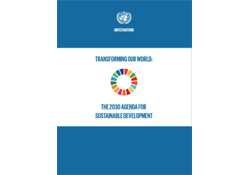2. What is special about the 2030 Agenda for Sustainable Development?

The 2030 Agenda is a bold call for action, setting out a vision and principles for sustainable development in the coming decade. The 2030 Agenda was adopted in 2015 at the United Nations summit in New York, United States of America, through United Nations General Assembly resolution 70/1 “Transforming our world: the 2030 Agenda for Sustainable Development”. It entered into force on 1 January 2016.
Through its goals, targets, indicators and mechanisms for follow-up and review, the 2030 Agenda has an unprecedented scope: in tackling all sectors and addressing the 3 pillars of sustainable development, it covers all social, environmental and economic determinants of health.
The 2030 Agenda is integrated and indivisible. Progress in one area is related to progress in other areas. Health targets are therefore distributed across all SDGs, and the integrated nature of the SDGs provides new legitimacy for addressing the wider determinants of health.
It is also inclusive, aiming to leave no one behind. It has a focus on equity and on reaching all people, including those who are hardest to access. This focus on equity is distributed across all SDGs and reflected by the need for disaggregated measures.
Finally, the 2030 Agenda is global in nature and universally applicable – it is relevant to all countries, both developed and developing, with common but differentiated responsibilities. Goals and targets take into account different national realities, capacities and levels of development. Each government is asked to set its own national targets guided by the global level of ambition but taking into account national circumstances.
The range of topics covered in the SDGs reflects the range of issues that a government faces on the ground, and addresses all health determinants. This means that achieving the SDGs requires work across sectors. The 2030 Agenda has a focus on monitoring, evaluation and accountability – this key feature for achieving equity and leaving no one behind also puts greater emphasis on country and regional follow-up and review processes as the basis for accountability and remedial action.



